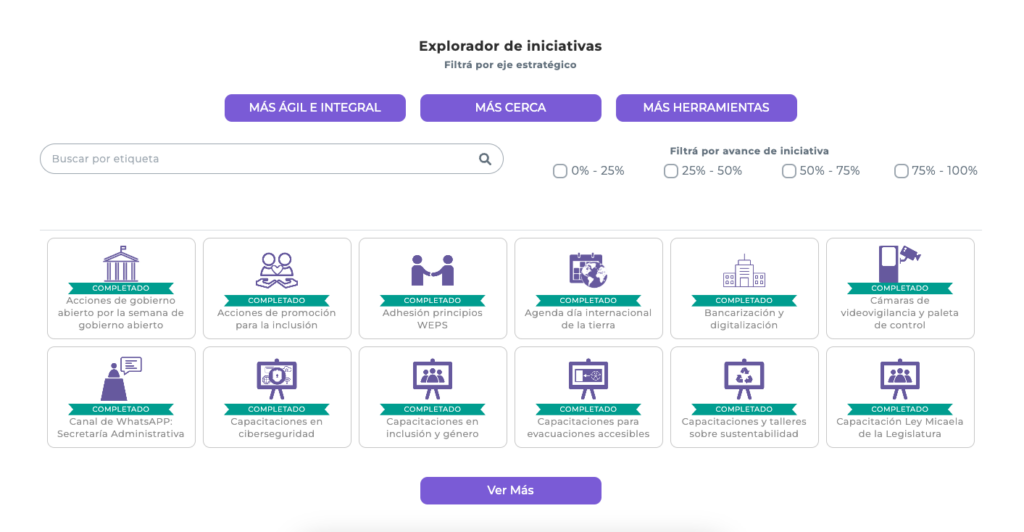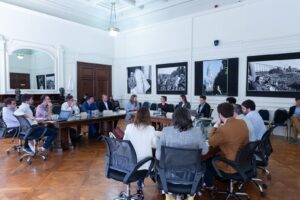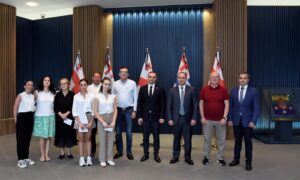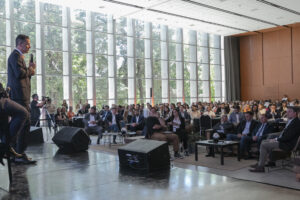Open Parliaments: The Case of Buenos Aires
Parlamentos Abiertos: el caso de Buenos Aires
Between 2021 and 2023, the Legislature of the Autonomous City of Buenos Aires adopted open government and active transparencyAccording to OGP’s Articles of Governance, transparency occurs when “government-held information (including on activities and decisions) is open, comprehensive, timely, freely available to the pub... More standards to promote a Legislative Branch that is closer to citizens. The Legislature, with which I have had the pleasure of working, carried out six specific actions to achieve this goal.
1. Made 120 public commitments, of which 95 percent were fulfilled.
To stay accountable to citizens, we’ve published an open management dashboard that allows them to know the initiatives we implement. The dashboard, which allows users to filter initiatives by strategic axis and degree of progress, is the first of its kind in a Latin American parliament. Some completed commitments include the implementation of digital signatures for parliamentary work, easier processes for purchases and contracts, the implementation of the citizen’s window, and the launch of the Legislative Dialogue portal.

2. Simplified the website to make it clearer, more agile, and user-friendly.
We redesigned the Legislature’s official website to improve the user experience. We simplified its architecture, reducing it from 54 to 22 pages so that all information is accessible within a maximum of three clicks. That way, we ensured access to information in a clear and transparent manner for all citizens, with more intuitive navigation and plain, simple language.
We also updated information on various contact channels, the public information access law, parliamentary statistics with systematized and precise information, and the public integrity office, which contains the financial disclosures of legislators and officials. Additionally, we added the open dataBy opening up data and making it sharable and reusable, governments can enable informed debate, better decision making, and the development of innovative new services. Technical specifications: Polici... portal, which already has 48 new and updated datasets in open format.
We recently published performance information for each legislator, including the number of legislative projects presented, parliamentary committees they belong to, and information about their team of collaborators.
3. Created the first Evidence-Informed Policy Office in the region.
With the support of all political blocs and parties, the office aims to improve the quality of legislative bills generated in the Legislature that impact the quality of life for the 3 million people living in Buenos Aires. The office was inspired by the international trend of creating scientific-legislative advisory bodies to promote legislative quality.
Among its main functions, the office supports and trains Legislature staff and committees in making evidence-informed decisions, and promotes prospective evaluations of projects and policy impact assessments. The office also assists legislators and advisors in searching and building data, backgrounds, and evidence for formulating projects, monitoring, and evaluating policies within the Autonomous City of Buenos Aires.
The office is a great example of an effective co-creation process with more than 43 stakeholders from Argentina and around the world, whose ideas and contributions enhanced this tool. We have a guide on evidence-informed policies and a self-paced course created, pro bono, by academic experts.

4. Promoted co-creation and citizen participationAccording to OGP’s Articles of Governance, citizen participation occurs when “governments seek to mobilize citizens to engage in public debate, provide input, and make contributions that lead to m... More initiatives.
Through the Legislature’s portal, anyone can access legislators’ proposals and contribute to co-creating legislative projects. During the 2023 Open Government Week, more than 100 participants from civil society, academia, legislators, and citizens co-created commitments through an IDEATHON. Together, we co-created commitments focused on providing training workshops to promote citizen participation, showcasing the “Legislature and School” program, implementing a usability analysis for continuous improvement of the user experience on the official website, or publishing a platform with explanatory content on laws in simple language.
5. An open legislature speaks a clear language.
As part of the goals set in the Open Government Roundtable and following plain language principles, we published a Clear Language Guide and generated content to raise awareness and promote its use among legislators. Additionally, we conducted a Self-Assessment Module in plain language and provided internal training to encourage the production of texts in plain language.

Implementing policies that brought us closer to a more open and accessible Parliament and fostered public dialogue allowed us to carry out reforms with greater social legitimacy and, therefore, are more likely to endure over time. Citizen participation during these processes and the interaction between legislators and the public were crucial to foster greater involvement, improving the institutional quality of Parliament, and increasing citizen trust. Within the institution, consensus-building among all blocs, beyond political party affiliation, was crucial to bring about substantive changes that brought us closer to a more professional Parliament, such as the creation of the evidence-informed policy office.
Entre 2021 y 2023, la Legislatura de la Ciudad Autónoma de Buenos Aires adoptó los estándares de gobierno abierto y transparencia activa para promover un Poder Legislativo más cercano a la ciudadanía. La Legislatura, con la que he tenido el placer de trabajar, llevó a cabo seis acciones puntuales para alcanzar este objetivo.
1. Asumió 120 compromisos públicos, de los cuales cumplió el 95 por ciento.
Los compromisos son metas públicas que asumimos con la ciudadanía y sobre las que rendimos cuentas de manera permanente. En el portal de la Legislatura publicamos un tablero abierto de gestión que permite que todas las y los ciudadanos conozcan las iniciativas que implementamos. El tablero, que permite filtrar las iniciativas por eje estratégico y por grado de avance, es el primero de su tipo en un parlamento en América Latina. Algunos compromisos cumplidos incluyen la implementación de la firma digital para la labor parlamentaria, la simplificación de procesos para las compras y las contrataciones, la implementación de la ventana ciudadana y la publicación del portal de Diálogo Legislativo.

2. Simplificó el sitio web para hacerlo más claro, ágil y amigable para la ciudadanía
Rediseñamos el sitio oficial https://legislatura.gob.ar/ para adaptarlo a la experiencia de las personas usuarias. Simplificamos su arquitectura y pasamos de 54 a 22 páginas, para que toda la información se encuentre en un máximo de tres clics. Así, aseguramos el acceso a información de una manera más clara y transparente a toda la ciudadanía, con una navegación más intuitiva y un lenguaje llano y simple.
También actualizamos la información sobre los distintos canales de atención, la ley de acceso a la información pública, estadísticas parlamentarias con información sistematizada y precisa y sobre la oficina de integridad pública, que contiene las declaraciones juradas de las y los legisladores y funcionarios. Además, agregamos el portal de datos abiertos que ya tiene 48 datasets nuevos y actualizados en formato abierto.
Recientemente publicamos información de desempeño de cada una de las y los legisladores, junto con el número de proyectos legislativos presentados, las comisiones parlamentarias a las que pertenecen, e información sobre el equipo de colaboradores.
3. Creó la primera Oficina de Políticas Informadas en Evidencia de la región.
Con apoyo de todos los bloques y partidos políticos, la oficina permite aumentar la calidad de los proyectos de ley que se generan en la Legislatura e impactan en la calidad de vida de 3 millones de personas que viven en la ciudad de Buenos Aires. La oficina nació inspirada en la tendencia internacional de crear organismos de asesoramiento científico-legislativo para promover la calidad legislativa.
Entre sus principales funciones, la oficina apoya a las comisiones a tomar decisiones informadas en evidencias, capacita al personal de la Legislatura en la toma de decisiones informadas en evidencias, promueve evaluaciones prospectivas de proyectos y evaluaciones de impacto de políticas, asiste a las y los legisladores y asesores en la búsqueda y construcción de datos, antecedentes y evidencias que sirvan para formular proyectos, monitorear y evaluar políticas en el ámbito de la Ciudad Autónoma de Buenos Aires.
La oficina es un gran ejemplo de un proceso de cocreación con más de 43 actores de la Argentina y el mundo que con sus ideas y aportes potenciaron esta herramienta. Contamos con una guía de políticas informadas en evidencia y un curso autogestionado que fueron realizados, ad honorem, por expertos del mundo académico.

4. Impulsó iniciativas de cocreación y participación ciudadana
A través del portal de la Legislatura, cualquier persona puede acceder a las propuestas de los legisladores para leerlas, apoyarlas y hacer aportes para cocrear proyectos legislativos con la Legislatura. Durante la Semana del Gobierno Abierto de 2023 cocreamos compromisos con la ciudadanía a través de un IDEATÓN en el que participaron más de 100 representantes de sociedad civil la academia, legisladores, estudiantes y la ciudadanía. Junto a ellas y ellos, cocreamos compromisos para una legislatura más abierta, como por ejemplo brindar talleres de capacitación para promover la participación ciudadana; visibilizar el programa “La Legislatura y la Escuela”; implementar un análisis de usabilidad para la mejora continua de la experiencia de usuario en el sitio web oficial; o publicar una plataforma de contenido explicativo de leyes en lenguaje simple.
5. Una Legislatura abierta habla un lenguaje claro
Como parte de las metas asumidas en la Mesa de Estado Abierto, y siguiendo los principios del lenguaje llano, publicamos una Guía de Lenguaje Claro en el sitio oficial de la Legislatura y generamos contenidos para sensibilizar y promover su uso a las y los legisladores. Además, realizamos un Módulo de Autoevaluación en Lenguaje Claro y brindamos capacitaciones internas para fomentar la producción de textos en lenguaje claro.

Haber implementado políticas que nos acercaran a un Parlamento más abierto y cercano y que favorezcan el diálogo público nos permitió llevar adelante reformas que contaron con mayor legitimidad social y, por ende, con mayores posibilidades de que se mantengan en el tiempo. La participación activa de la ciudadanía y de la sociedad civil durante estos procesos y la interacción entre los legisladores y la ciudadanía fueron clave para generar mayor involucramiento, mejorar la calidad institucional del Parlamento y aumentar la confianza ciudadana. Asimismo, hacia el interior de la institución, generar consensos de todos los bloques, más allá de la pertenencia político-partidaria, fue clave para generar cambios sustantivos que nos acercaran a un Parlamento más profesional, como fue la creación de la oficina de políticas informadas en evidencia.
No comments yet
Related Content
 Challenges and Solutions
Challenges and Solutions
Open Parliaments: The Case of the State of Guanajuato, Mexico
Guanajuato is one of the 32 states in Mexico and its State Congress is made up of 36 local congresspeople who represent over 6 million citizens.
 Challenges and Solutions
Challenges and Solutions
Open Parliaments: The Case of the Autonomous Republic of Adjara, Georgia
The Autonomous Republic of Ajara is a political-administrative region of Georgia. Its Supreme Council is made up of 21 congresspeople who represent about 350,000 citizens. While the Autonomous Republic of…
 Challenges and Solutions
Challenges and Solutions
Open Parliaments: The Case of the Córdoba Province, Argentina


Leave a Reply